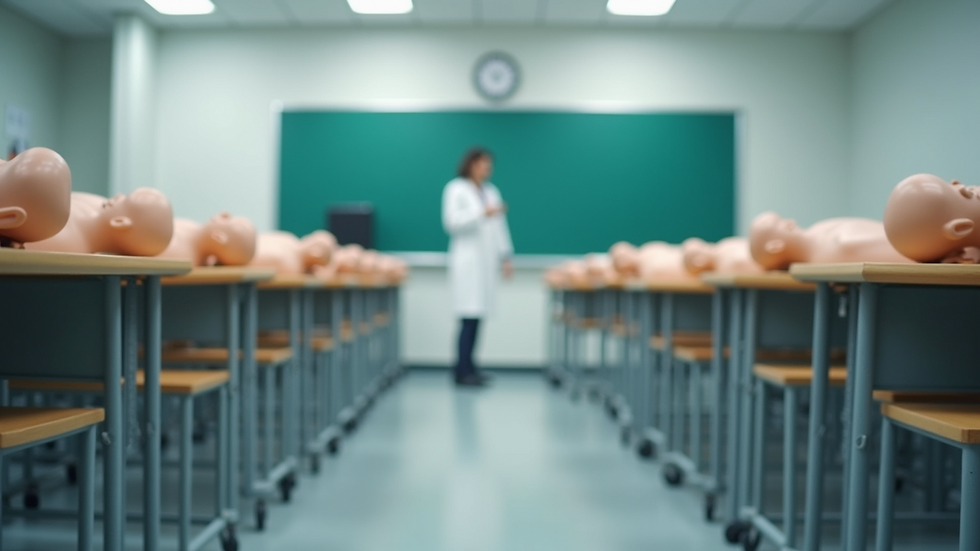Surviving Against the Odds: How CPR Training Saved Zach Nelson's Life After a Cardiac Arrest
- Mar 21, 2023
- 2 min read
Updated: May 31, 2023

The story of Zach Nelson, a teacher who survived a cardiac arrest thanks to his wife's quick thinking and CPR training, highlights the importance of CPR training in the community. In fact, CPR can be a life-saving technique that everyone should learn, regardless of age or profession.
According to statistics, around 70% of cardiac arrests occur in a residential setting. This means that the chances of surviving a cardiac arrest can be doubled if CPR is initiated as soon as possible by a bystander, rather than waiting for medical help to arrive.
In the case of Zach Nelson, his wife's CPR training and quick action saved his life. After experiencing a cardiac arrest, he spent four days in the intensive care unit before being fitted with an implantable cardioverter defibrillator to shock his heart back into rhythm if necessary.
Now, as a teacher, Zach shares his experience with his students and encourages them to learn about heart health and CPR. He even led his school in the Kids Heart Challenge of the American Heart Association. His efforts have paid off as several parents have reported their children knowing what to do if his ICD went off after a news report about him appeared on television.
CPR training can be a simple yet powerful skill that can make a difference in someone's life. It is not only for medical professionals but for everyone in the community. You never know when you might be the first person to arrive at the scene of a cardiac arrest, and knowing CPR could be the difference between life and death.
In conclusion, the story of Zach Nelson highlights the importance of CPR training in the community. We must take this opportunity to learn this life-saving technique and be ready to take action in the event of an emergency. It could mean the difference between someone living or not.
Learn, Enjoy, and Save Life. Healthforce Training Center offers CPR Training and certifications such as Basic Life Support (BLS), Advance Cardiovascular Life Support (ACLS), Pediatric Advance Life Support (PALS), CPR AED, Pediatric First Aid CPR AED, and First Aid CPR AED.
Read more of our blogs.





Polishing Polishing Polishing Polishing Polishing Polishing Polishing Polishing Polishing Polishing Polishing Polishing Polishing Polishing Polishing Polishing Polishing Polishing Polishing Polishing Polishing Polishing Polishing Polishing Polishing Polishing Polishing Polishing Polishing Polishing Polishing Polishing Polishing Polishing Polishing Polishing Polishing Polishing Polishing Polishing Polishing Polishing Polishing Polishing Polishing Polishing Polishing Polishing
IPTV IPTV IPTV IPTV IPTV IPTV IPTV IPTV IPTV IPTV IPTV IPTV IPTV IPTV IPTV IPTV IPTV IPTV IPTV IPTV IPTV IPTV IPTV IPTV IPTV IPTV IPTV IPTV IPTV IPTV IPTV IPTV IPTV IPTV IPTV IPTV IPTV IPTV IPTV IPTV IPTV IPTV IPTV IPTV IPTV IPTV IPTV IPTV IPTV IPTV
IPTV IPTV IPTV IPTV IPTV IPTV IPTV IPTV IPTV IPTV IPTV IPTV IPTV IPTV IPTV IPTV IPTV IPTV IPTV IPTV IPTV IPTV IPTV IPTV IPTV IPTV IPTV IPTV IPTV IPTV IPTV IPTV IPTV IPTV IPTV IPTV IPTV IPTV IPTV IPTV IPTV IPTV IPTV IPTV IPTV IPTV IPTV IPTV IPTV IPTV
Dubai Marble Polishing Company Dubai Marble Polishing Company Dubai Marble Polishing Company Dubai Marble Polishing Company Dubai Marble Polishing Company Dubai Marble Polishing Company Dubai Marble Polishing Company Dubai Marble Polishing Company Dubai Marble Polishing Company Dubai Marble Polishing Company Dubai Marble Polishing Company Dubai Marble Polishing Company Dubai Marble Polishing Company Dubai Marble Polishing Company Dubai Marble Polishing Company Dubai Marble Polishing Company Dubai Marble Polishing Company Dubai Marble Polishing Company Dubai Marble Polishing Company Dubai Marble Polishing Company Dubai Marble Polishing Company Dubai Marble Polishing Company Dubai Marble Polishing Company Dubai Marble Polishing Company Dubai Marble Polishing Company Dubai Marble Polishing Company Dubai Marble Polishing Company Dubai Marble Polishing Company Dubai Marble Polishing Company Dubai Marble Polishing Company…
Dubai Marble Polishing Company">IPTV Dubai Marble Polishing Company">IPTV Dubai Marble Polishing Company">IPTV Dubai Marble Polishing Company">IPTV Dubai Marble Polishing Company">IPTV Dubai Marble Polishing Company">IPTV Dubai Marble Polishing Company">IPTV Dubai Marble Polishing Company">IPTV Dubai Marble Polishing Company">IPTV Dubai Marble Polishing Company">IPTV Dubai Marble Polishing Company">IPTV Dubai Marble Polishing Company">IPTV Dubai Marble Polishing Company">IPTV Dubai Marble Polishing Company">IPTV Dubai Marble Polishing Company">IPTV Dubai Marble Polishing Company">IPTV Dubai Marble Polishing Company">IPTV Dubai Marble Polishing Company">IPTV Dubai Marble Polishing Company">IPTV Dubai Marble Polishing Company">IPTV Dubai Marble Polishing Company">IPTV Dubai Marble Polishing Company">IPTV Dubai Marble Polishing Company">IPTV Dubai Marble Polishing Company">IPTV Dubai Marble Polishing Company">IPTV Dubai Marble Polishing Company">IPTV Dubai Marble Polishing Company">IPTV Dubai Marble Polishing Company">IPTV Dubai Marble Polishing Company">IPTV Dubai Marble Polishing Company">IPTV…